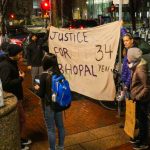The Cannabis Advisory Board held a public forum Thursday morning to discuss draft regulations concerning the use of marijuana in Massachusetts. These regulations will address several aspects of marijuana use, including safety, licensing fees and growing regulations.
The CAB’s Market Participation Subcommittee meeting focused on recommendations that the board gave to the Cannabis Control Commission that were excluded from the most recent draft regulations.
Kamani Jefferson, president of the Massachusetts Recreational Consumer Council, said before the meeting that he doesn’t think there is enough diversity among those involved in the industry.
“Market participation also includes trying to get more women involved, more veterans involved and minorities involved,” Jefferson said in an interview. “We’re not seeing that right now. The people who are licensed in Massachusetts to hold a dispensary are very well financed, well funded and they tend to look like a certain type of people.”
One of their chief concerns was equity within the industry and reparations for damages done to certain communities during the war on drugs, Shanel Lindsay, board member, said during the meeting.
“We’re already at a deficit in this industry in respect to ownership access to all the different communities that, as a subcommittee, we represent,” Lindsay said. “Any further delays … [are] unacceptable. It just serves to further entrench the inequities we already see in the system.”
Ginger Jackson-Gleich, a second-year law student at Harvard University, said she wanted more movement on the subject of equity, especially for the people unrightly charged with drug crimes.
“I have been working in a clinic there representing criminal defendants in the Roxbury courthouse,” Jackson-Gleich said in an interview. “Many of [our clients] have been charged with drug crimes in the last year, even since legalization.”
Gabriela Cartagena, co-founder of the MRCC, said youth and people of color have been disproportionately victimized by the war on drugs. She said the CCC must make entry to the cannabis industry more equitable to curb this trend.
“Youth of the age 14-24 and people of color have been targeted the most by unfair and inadequate prohibition and law enforcement,” Cartagena said. “Now we’re just trying to make sure the CCC actually acts in favor of the community instead over big dispensaries … They [need to] provide no-barrier-to-entry licenses so people with not enough capital can join the industry.”
Jackson-Gleich, citing her court experiences, said the lack of representation in the cannabis industry exists in the racial disparity between people on the CCC and those who are criminal drug offenders.
“When I started going to commission meetings, I realized who was sitting in the commission meetings was really different from who is sitting in court in Roxbury,” Jackson-Gleich said.
Another CAB concern was the accessibility of licensing. Currently, the draft regulations include a two-tiered system for licensing rollout, which the board opposes.
“There is no way we can be part of a two-tiered process and call ourselves equitable,” said board member Horace Small. Following this, all board members present at the meeting voted to recommend the removal of a two-tiered system.
Board member Nichole Snow said she was concerned about licensing for bring-your-own-cannabis social consumption sites and their possible prohibition’s effect on tourism in Massachusetts.
Mats Holmqvist, 55, of Malden, said he came to the meeting because he was curious about how the rollout of the cannabis industry in Massachusetts would look.
“I’m curious to see what they do here,” Holmqvist said. “I [want to know if] people will be able to establish cafes like they have in Holland for tourists from abroad.”
Jefferson said during the public forum the Massachusetts government should move to increase marijuana crime expungement. This would call for cannabis-related crimes to be removed from people’s criminal records, because it is no longer illegal in the state. Expungement has already been implemented in states like California.
In a recent press release, the MRCC said expungement is a racial equality issue, citing a statistic from the American Civil Liberties Union stating black Americans are 3.7 times more likely to be arrested for marijuana possession than white Americans.
Moving forward, the CAB plans to submit its recommendations to the CCC and Joint Committee on Marijuana Policy with the hope that the draft regulations will change to reflect their recommendations.
The CCC expects to enact the final regulations for the state industry by Mar. 15, with the first license applications to be available at the beginning of April.




